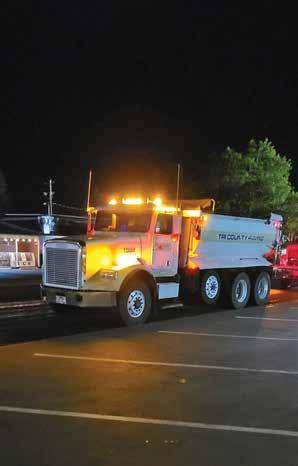Healthy buildings vital to returning to normalcy By allowing fresh air into the classroom, it dilutes and displaces airborne particles to assist in the decrease of virus transmission.
By Kristine Thomas
minimum requirements during occupancy periods,” Miller said. “In addition, we disabled all demand-control ventilation control strategies to keep from limiting the amount of outside air being introduced to areas with high occupancy potential. Filters have been upgraded as well to meet ASHRAE guidelines.” Miller said the district also installed water bottle stations in its building as part of the district’s COVID-19 prevention strategy.
An unhealthy building can contribute to
circulates through buildings and are
unhealthy occupants.
studying ways to test the health of the
That’s why in the last year people
building for viruses.
responsible for schools, grocery
The idea is that instead of testing people,
stores, office buildings, and everything
they will test the building to implement
in between have focused on what
disease prevention and manage the risks.
preventable steps they can take to combat
Mitigation strategies include minimizing
the spread of contagious diseases,
the recirculation of air and increasing
including COVID-19. Keeping surfaces,
filtration and the flow of fresh air can
floors and door handles clean to eliminate
make the air safer for occupants.
the virus is a tedious but simple step to take.
Throughout the state of Oregon school districts are sharing notes on what they
The more challenging one is fighting the
have done to make their buildings safe for
invisible germs and viruses in the air.
the return of students and staff members.
Several industry experts, including Peggy
Sheila Miller, the public information officer
White at Tri County Climate in Bend,
for the Redmond School District, said the
shared that they have seen an increase
passage of the district’s 2020 bond will
of purchases of air filtration systems to
provide for a variety of safety upgrades.
reduce the transmission of airborne germs
For example, the district reprogrammed
and viruses.
its HVAC systems to adhere to ASHRAE
The University of Oregon’s Institute for
guidelines.
Health in the Built Environment shared
“This included a 100 percent outside
in a news release that it worked with the
air flushing of the buildings, two hours
Biology and Built Environment Center to
before occupancy and two hours after
understand how viruses like COVID-19
occupancy, and raising the outside air
In the Springfield School District in Springfield, OR, the district facilities staff has increased the amount of fresh air coming into the buildings by adjusting their HVAC systems. The district also upgraded its filters to kill microorganisms. The district installed iWave air purifiers in its HVAC systems. The iWave uses ions to kill pathogens to rob them of their lifesustaining hydrogen and cleans the air everywhere the ions travel. Bend-La Pine Schools Communication Supervisor Alandra Johnson said updates to the HVAC systems in its schools and buildings will maximize fresh outdoor air and minimize indoor air recirculation. By allowing fresh air into the classroom, it dilutes and displaces airborne particles to assist in the decrease of virus transmission. “Thanks to updates to our systems, our schools’ HVAC systems will bring in fresh air an hour before school starts, as well as throughout the day as we filter classroom air through medical-grade MERV-13 filters six to seven times each hour,” Johnson said. “Bend-La Pine Schools will operate ventilation systems properly and/ or increase circulation of outdoor air as much as possible by opening windows and doors, using fans and through other methods.” l CONNECT Industry Resource Guide – 2021
11









